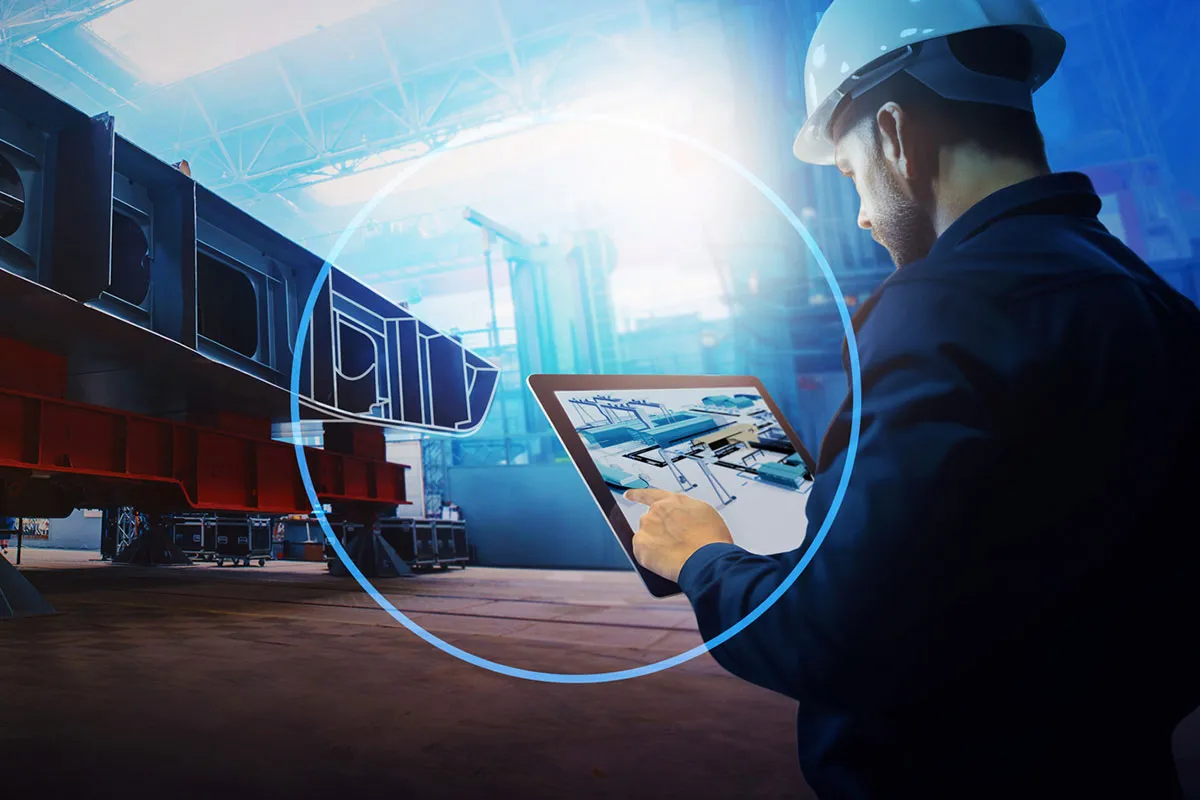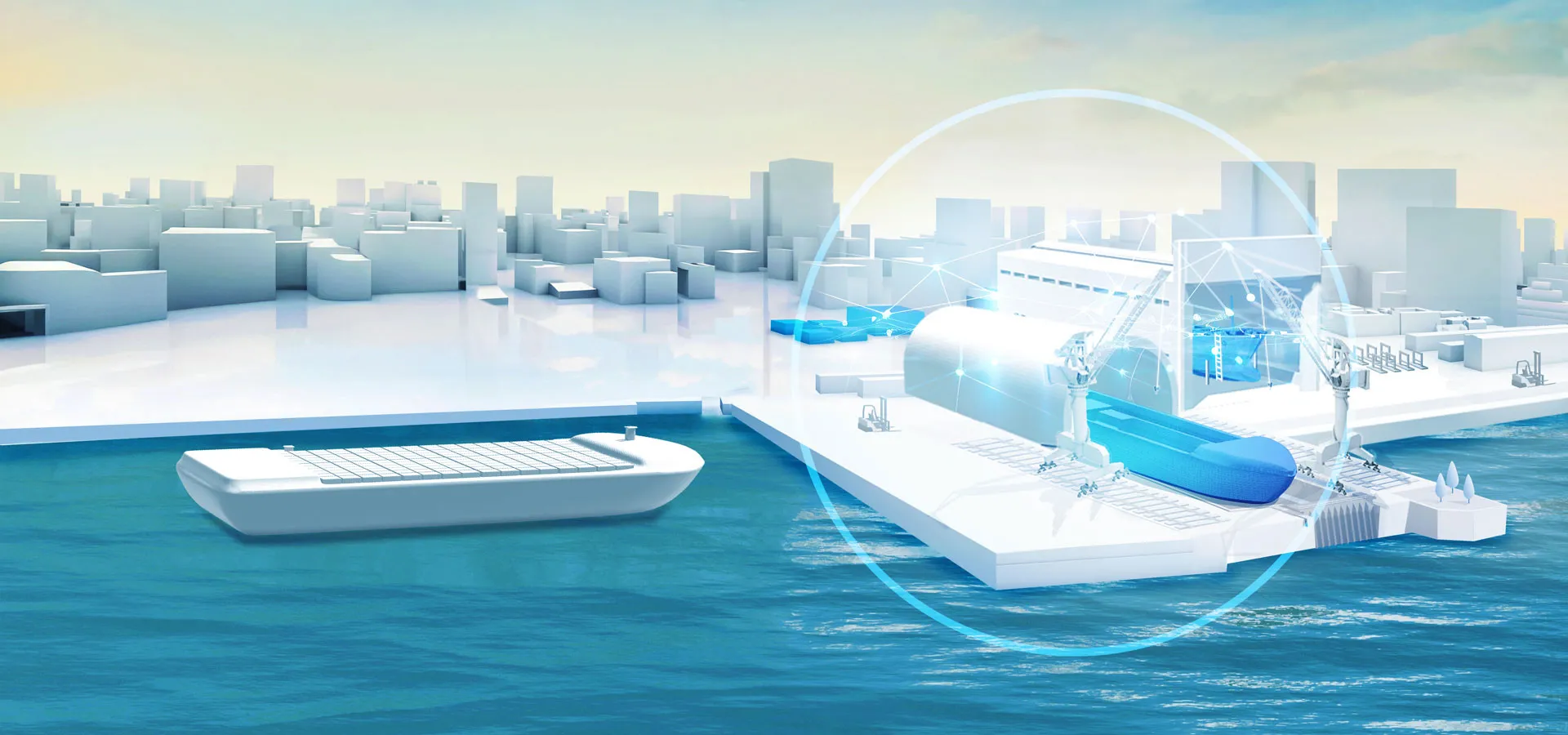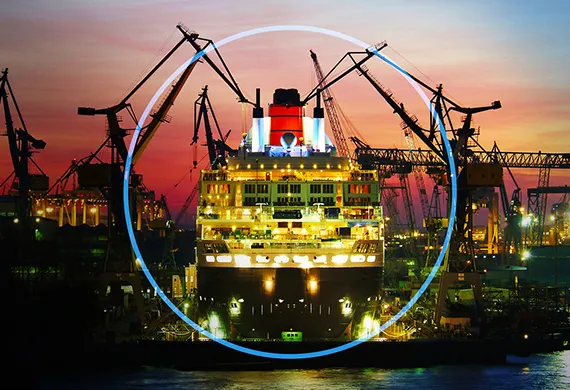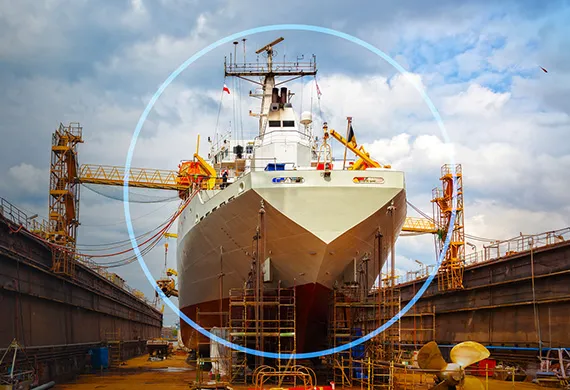From Traditional Shipbuilding to Smart Shipyards
Manage, control and optimize shipbuilding processes – from engineering to manufacturing – and meet customer demands for time, cost and quality.
As the shipbuilding industry keeps growing, a 40 million compensated gross tonnage (CGT) output is forecasted for 2024 and 2025, mainly driven by growth in South Korea, China and Japan. International efforts to lower greenhouse gas (GHG) emissions place shipyards under pressure to develop cleaner and greener vessels to replace old ships and reduce the carbon footprint of existing fleets.
Meeting these new standards requires the implementation of new manufacturing processes. Worldwide shipyards must find new ways to avoid falling behind the competition and be open to new market opportunities. Implementing new technologies without disrupting production will allow them to be best-in-class and remain competitive in their respective markets.
As it stands, 90% of the cost for a container ship is incurred during the production phase. Thus, shipyards need transformative technologies in production lines to gain agility in manufacturing operations, increase capacity, boost productivity and improve profits.
Shipbuilders must also transform how their organizations operate and unlock new efficiencies – by working smarter and faster – without sacrificing quality. Creating a smart digital shipyard provides a clear vision of the production status, which enables shipbuilders to understand the present and forecast the future. An integrated smart digital shipyard includes production automation and connectivity among all shipyard resources. These capabilities support planning and scheduling optimization as well as efficient manufacturing operations management.
Answer Shipbuilding Challenges With Digital Manufacturing
SOHAIB TELHIMT KASMI
Marine and Offshore
Industry Business Consultant
Dassault Systèmes
Ship Manufacturing Challenges
Today's shipyards face challenges on many fronts and must transform their process to stay competitive.
Challenge: On-Time Delivery of Ships
Delivering on time is not an option; it's a must for shipyards to stay profitable and remain competitive
Challenge: Optimizing Shipyard Infrastructure
Optimize shipyard infrastructure capacity to improve productivity and margin.
Challenge: Workforce Management
The shipbuilding industry requires an experienced workforce to undertake highly complex projects like submarines or commercial vessels.

What Is a Smart Shipyard?
The smart shipyard helps shipbuilders deliver as designed, on time and on budget by leveraging:
- Virtual simulation of production parts and processes
- Real-time collaboration across the shipyard ecosystem
Powered by Dassault Systèmes' virtual twin technology, the smart shipyard's model-based approach provides a consistent and consolidated view of managing resources and operations across all project phases. It also contains a feedback loop for the entire shipyard ecosystem – such as engineering, production, suppliers and classification societies. Integrating the whole shipyard's production processes into a manufacturing operations management solution is key to improving the first-time-right rate for global shipyards.
Autonomous Shipyard: A Revolution For Ship Production
Technologies such as Digital Manufacturing (DM), Production Automation, and Augmented Reality (AR) are transforming the shipbuilding industry.
Ensure on-time delivery of ships
A penalty is applied to the shipyard by the ship owner for each day of delay, jeopardizing the shipyard s ability to generate profit from the manufactured vessel.
Optimize shipyard infrastructure
The world s largest shipyards build over 40 ships annually, requiring around 40,000 small, medium or large blocks. This requires significant space, crane capacity and dry dock availability.
Manage workforce
Shipyards face a shortage of skilled labor and workforce. For example, most shipyards have issues securing or finding skilled labor with over five years of experience.
Shipbuilding challenges will continue escalating, and transitioning from traditional shipbuilding to smart shipyards is imperative. Backed by innovative smart shipyard solutions, Dassault Systèmes' 3DEXPERIENCE platform is well-positioned to accelerate the deployment of sustainable smart shipyards – that can withstand global shipbuilding challenges – to fulfill quality, time and cost demands.
Model-Based Manufacturing in Shipbuilding
Dassault Systèmes' 3DEXPERIENCE® platform enables a model-based approach for a smart shipyard. Model-based manufacturing is a methodology that relies on digital models of products and processes to guide shipyard operations. It uses 3D models to create, simulate and optimize shipbuilding production processes.
However, a model-based approach is not just about modeling; it's also about improving the model for different scenarios and ensuring that the optimal form and fit can deliver the experience. This leads to more efficient production, reduced errors and improved quality control. Furthermore, the 3DEXPERIENCE platform provides shipbuilders with end-to-end model-based configuration management – covering the entire shipbuilding lifecycle – from engineering to manufacturing.
"An EU-funded Smart European Shipbuilding (SEUS) project and its associated consortium anticipate that smart shipbuilding could reduce the time needed for ship engineering by 30% and cut assembly times by up to 20%."
– Rob O'Dwyer, Smart Maritime Council Chairman
Source: Smart Maritime Network
Optimize Manufacturing Operations
Connect the dots to improve shipyard automatization and delivery rate






